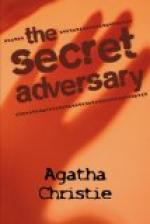The door was opened by an irreproachable butler. Tuppence felt a little nervous. After all, perhaps it was colossal cheek on her part. She had decided not to ask if Sir James was “at home,” but to adopt a more personal attitude.
“Will you ask Sir James if I can see him for a few minutes? I have an important message for him.”
The butler retired, returning a moment or two later.
“Sir James will see you. Will you step this way?”
He ushered them into a room at the back of the house, furnished as a library. The collection of books was a magnificent one, and Tuppence noticed that all one wall was devoted to works on crime and criminology. There were several deep-padded leather arm-chairs, and an old-fashioned open hearth. In the window was a big roll-top desk strewn with papers at which the master of the house was sitting.
He rose as they entered.
“You have a message for me? Ah”—he recognized Tuppence with a smile—“it’s you, is it? Brought a message from Mrs. Vandemeyer, I suppose?”
“Not exactly,” said Tuppence. “In fact, I’m afraid I only said that to be quite sure of getting in. Oh, by the way, this is Mr. Hersheimmer, Sir James Peel Edgerton.”
“Pleased to meet you,” said the American, shooting out a hand.
“Won’t you both sit down?” asked Sir James. He drew forward two chairs.
“Sir James,” said Tuppence, plunging boldly, “I dare say you will think it is most awful cheek of me coming here like this. Because, of course, it’s nothing whatever to do with you, and then you’re a very important person, and of course Tommy and I are very unimportant.” She paused for breath.
“Tommy?” queried Sir James, looking across at the American.
“No, that’s Julius,” explained Tuppence. “I’m rather nervous, and that makes me tell it badly. What I really want to know is what you meant by what you said to me the other day? Did you mean to warn me against Mrs. Vandemeyer? You did, didn’t you?”
“My dear young lady, as far as I recollect I only mentioned that there were equally good situations to be obtained elsewhere.”
“Yes, I know. But it was a hint, wasn’t it?”
“Well, perhaps it was,” admitted Sir James gravely.
“Well, I want to know more. I want to know just why you gave me a hint.”
Sir James smiled at her earnestness.
“Suppose the lady brings a libel action against me for defamation of character?”
“Of course,” said Tuppence. “I know lawyers are always dreadfully careful. But can’t we say ‘without prejudice’ first, and then say just what we want to.”
“Well,” said Sir James, still smiling, “without prejudice, then, if I had a young sister forced to earn her living, I should not like to see her in Mrs. Vandemeyer’s service. I felt it incumbent on me just to give you a hint. It is no place for a young and inexperienced girl. That is all I can tell you.”




